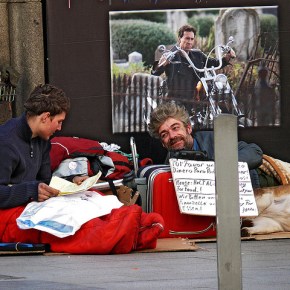Nalchik is the capital of Russia’s autonomous region of Kabardino-Balkaria, nestled in the foothills of the Caucasus and Mount Elbrus. 550 metres above sea level, its air is crisp and pungent with the scent of tourist repellent, the unfortunate result of its proximity to such hotspots as Ingushetia and Chechnya.
Home to the Circassian Kabardians and Turkic Balkars, Nalchick is overshadowed by the concrete gaze of Sosruko, mythical hero of the Narts who gave the Circassians fire. He stands stalwart, a restaurant in his skull and lurid red flame in outstretched arm. Sosruko’s legacy came to Nalchik in 2005 as leaders of the local Yarmuk Jamaat, led by Shamil Basayev, seized local government buildings, resulting in nearly 140 deaths.
In 2011, the Russian government initiated an anti-terror regime after the murders of several tourists to the region. Nalchik is quiet now, the fevered demonstrations of loyalty fluttering quietly in the breeze (“Dear citizens, please remember that our unity is in our strength.”) It is a green and pleasant city, yet a fixation on current affairs keeps one edge. “Grozny, 200 kilometres,” say the road signs on the way into the city.
“Grozny normalno!” (Nah, Grozny’s alright!) respond Nalchik locals.
In neighbouring Karachai-Cherkessia – the second furthest west, and generally least affected by terrorism of the string of Russia’s autonomous Republics – Russian taxi driver Dima pre-empts the fears he assumes I must hold . “What would terrorism bring these people?” he asks, sweeping a palm across the mainly Karachai village of Uchkeken. “All they have are their horses and tourism. Terrorism is everywhere. You have it over in America.”
‘I’m from Britain’
‘Fine, well Britain then’ he replies, exasperated.
On the M29, the ambitiously named Caucasus Highway, my curiosity overtakes me.
‘How much to Vladikavkaz?’
Dima raises an eyebrow.
‘Ten Thousand Roubles’
‘How much to Grozny?’
Dima raises both.
‘Eighteen thousand roubles’.
‘Is the return journey included?’
Dima laughs. We reached sleepy Kislovodsk.
United Russia’s electoral promise that the Northern Caucasus would become a tourist centre by 2014 seems wilfully disingenuous at worst, breathtakingly naïve at best. Strolling the lush gardens of Lermontov’s old haunts in Kislovodsk or Pyatigorsk, one can understand the sentiment. The natural beauty is unequalled. One of the issues at stake could be that everybody else thinks so too.
The seaside resort of Sochi, where the prices, real estate, and swagger are positively Muscovite, hosts the Winter Olympics in 2014. Obvious economic benefits aside, this could be perceived as a show of strength by those easily roused to resentment. In May 2012, a large arms stockpile was discovered in a rural region of nearby Abkhazia, which was believed by the Russian government to be part of a plan to attack Sochi and its growing tourist industry in preparation for the Winter Olympic games.
There is a sense of something disconsolate underneath the beauty. Sometimes instinct and paranoia blend, and it can be a feat to untangle them. Comparatively little from these Republics reaches western headlines, while the pursuit of investigative journalism for local reporters in the three neighbouring Republics of Ingushetia, Chechnya, and Dagestan has proven to be an insurmountable bar to survival for those still obstinate enough to attempt it.
Strolling through the pleasant older streets of Nalchik in the city’s Kabardian Quarter, a local friend showed me the Victory Cinema. It is long since defeated by time and neglect. A dubious figure in a raincoat loitered in a nearby alleyway chain smoking. On its roof stand two dancing Kabardians in national costume, immortalised in concrete half-prance. It seems an apt metaphor, but for what exactly still eludes me.
Photograph courtesy of Wikipedia. Published under a Creative Commons license.





